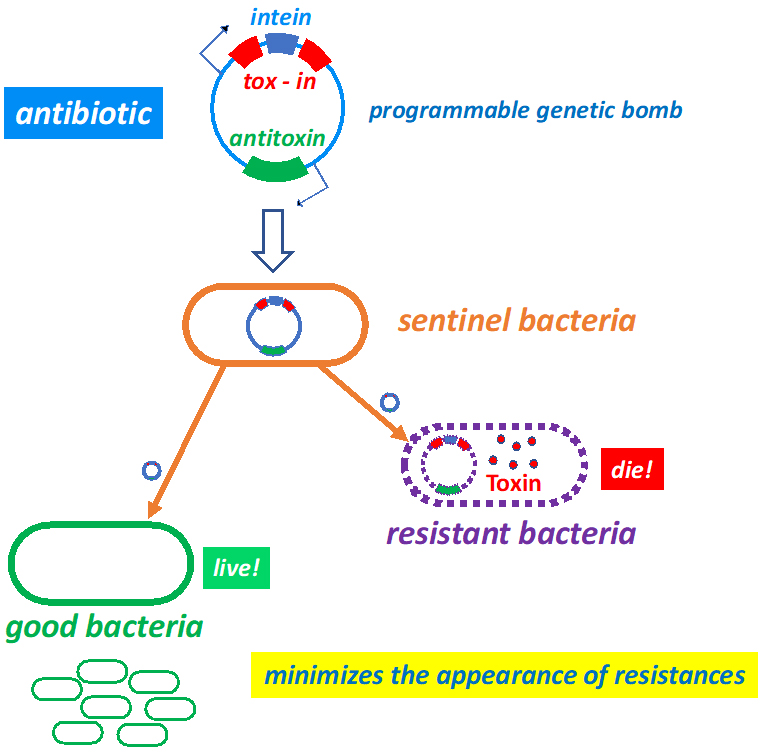A big step towards programmable and selective antibiotics
Researchers in Universidad Politécnica de Madrid (UPM) and Institute Pasteur are developing a new generation of antibiotics that avoid the appearance of resistances and that are very selective because they are designed to attack especially to the virulent or resistant bacteria. The results are published in Nature Biotechnology journal.
Antibiotics are the first fundamental line of defense that medicine has to fight against bacterial infections. One of the main negative effects of antibiotics is that they attack indiscriminately to almost all the bacteria in our body (including beneficial bacteria) inducing the appearance of the feared multi-resistant bacteria. In fact, the World Health Organization estimations for 2050 says that 10 million people could die annually due to antibiotic- resistant infections. An international work between researchers in Universidad Politécnica de Madrid (UPM) and Institute Pasteur has engineered a new type of programmable antibiotics able to kill only the “bad” bacteria and avoiding the resistance appearance. The initial results are shown in Nature Biotechnology journal.
“In the same way that probiotics (bacteria) are being developed to regulate the bacteria that we have in our gut microbiota, we have designed programmable “sentinel bacteria” able to detect and kill just to the dangerous bacteria without harming the good ones”, explains Alfonso Rodríguez-Patón, professor at the Departamento de Inteligencia Artificial in the Escuela Técnica Superior de Ingenieros Informáticos at UPM and one of the coauthors of this work.
To achieve this, the researchers have developed what they have named a “programmable genetic bomb”: “our antibiotic, carried by sentinel bacteria, is a toxin (the genetic bomb) programmed to be activated and to kill only when detecting and recognizing bad bacteria (a virulent or antibiotic resistant one)”, adds Rodríguez-Patón. The sentinel bacteria transmit this bomb to its neighboring bacteria through a process called conjugation. “Conjugation is a DNA transmission mechanism used by bacteria, and that we have programmed in sentinel bacteria to spread the genetic bomb to the surrounding bacteria. If the bomb arrives at a dangerous bacterium, it will detect some molecular signals as the virulence or antibiotic resistance activating it and killing that bacterium. However, if the genetic bomb is inserted in a good bacterium, it will do nothing” continues the UPM researcher.

This selective activation mechanism of the bomb can be programmed to attack other different resistant bacteria, and it works due to a molecule called “intein” for which Institut Pasteur has filed a patent.
Sentinels against resistant bacteria
The results of this new generation of antibiotics have been experimentally tested in living organisms like zebrafish and crustaceous infected with the aquatic cholera bacteria (Vibrio cholerae). “We have achieved that our antibiotic removes the antibiotic-resistant and virulent cholera from the infected zebrafish keeping alive the rest of non-harmful bacteria present in those fishes. This is relevant because cholera also affects to more than 1 million people every year and in severe cases it causes death”, explains Rodríguez-Patón.
This work has been done by engineers, physicists, and microbiologists from UPM and Institut Pasteur with the funding of the European Union research project PLASWIRES (PLASmids-as-WIRES) coordinated by Rodríguez-Patón. “This interdisciplinary FET (Future and Emerging Technologies) research project allowed us to be very ambitious and afford the design of this new kind of antibiotics even knowing that there was a high chance of failure. They were 5 long years of trying many genetic circuit variants, many experiments that didn’t work but, at the end, thanks to the tenacity and expertise of the whole consortium and in special of Mazel’s group in Pasteur and his postdoc researcher Rocío López-Igual (the “MasterChef” of the antibiotic) we succeeded.
This research is pioneering, and its results are revolutionary because for the first time the doors are open to the development of antibiotics truly selective, programmable, and able to kill even traditional antibiotics-resistant bacteria. “These new antibiotics can be programmed to attack Gram-positive or Gram-negative bacteria.” Additionally, he points to a future pending investigation: “Not only can they be applied to kill bacteria but they might also work as anticancer agents since some of our toxins can be programmed against tumor cells” remarks Rodríguez-Patón.
“Much remains to be done to demonstrate the correct working inside human beings, but the results we have already obtained are very promising and constitute the starting point of a new generation of antibiotics” concludes the UPM researcher.
https://www.youtube.com/watch?v=H8WA_8Yfjno&feature=youtu.be
Source: Nature Biotechnology journal:
Rocío López-Igual, Joaquín Bernal-Bayard, Alfonso Rodríguez-Patón, Jean-Marc Ghigo, and Didier Mazel. Engineered toxin-intein antimicrobials can selectively target and kill antibiotic-resistant bacteria in mixed populations, Nature Biotechnology, 2019.
Full-text access: DOI: 10.1038/s41587-019-0105-3


